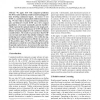1262 search results - page 141 / 253 » Reinforcement Learning: An Introduction |
CEC
2005
IEEE
13 years 10 months ago
2005
IEEE
We apply XCS with computed prediction (XCSF) to tackle multistep reinforcement learning problems involving continuous inputs. In essence we use XCSF as a method of generalized rein...
ICML
2006
IEEE
14 years 9 months ago
2006
IEEE
How should a reinforcement learning agent act if its sole purpose is to efficiently learn an optimal policy for later use? In other words, how should it explore, to be able to exp...
AAAI
1996
13 years 9 months ago
1996
Procedural representations of control policies have two advantages when facing the scale-up problem in learning tasks. First they are implicit, with potential for inductive genera...
SOCROB
2010
2010
Using the Interaction Rhythm as a Natural Reinforcement Signal for Social Robots: A Matter of Belief
13 years 6 months ago
Abstract. In this paper, we present the results of a pilot study of a human robot interaction experiment where the rhythm of the interaction is used as a reinforcement signal to le...
ICRA
2009
IEEE
14 years 2 months ago
2009
IEEE
Abstract— Least-squares policy iteration is a useful reinforcement learning method in robotics due to its computational efficiency. However, it tends to be sensitive to outliers...

